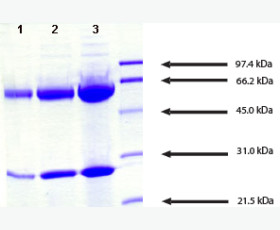Recombinant Human Cocaine- and Amphetamine-Regulated Transcript/CARTPT
| Product name: | Recombinant Human Cocaine- and Amphetamine-Regulated Transcript/CARTPT |
| Source: | Human Cells |
| Purity: | Greater than 95% as determined by reducing SDS-PAGE. |
| Buffer Formulation: | Lyophilized from a 0.2 μm filtered solution of 20mM PB,150mM NaCl,pH7.4. |
| Applications: | Applications:SDS-PAGE; WB; ELISA; IP. |
| Storage: | Avoid repeated freeze/thaw cycles. Store at 2-8 oC for one month. Aliquot and store at -80 oC for 12 months. |
| UOM: | 100ug/50ug/200ug/1mg/1g |
| Source | Human Cells |
| Description | Recombinant Human CARTPT is produced by our Mammalian expression system and the target gene encoding Gln28-Leu116 is expressed with a 6His tag at the C-terminus. |
| Names | Cocaine- and Amphetamine-Regulated Transcript Protein, CARTPT, CART |
| Accession # | Q16568 |
| Formulation | Lyophilized from a 0.2 μm filtered solution of 20mM PB,150mM NaCl,pH7.4. |
| Shipping |
The product is shipped at ambient temperature. |
| Reconstitution |
Always centrifuge tubes before opening. Do not mix by vortex or pipetting. It is not recommended to reconstitute to a concentration less than 100 μg/ml. Dissolve the lyophilized protein in ddH2O. Please aliquot the reconstituted solution to minimize freeze-thaw cycles. |
| Storage |
Lyophilized protein should be stored at < -20°C, though stable at room temperature for 3 weeks. Reconstituted protein solution can be stored at 4-7°C for 2-7 days. Aliquots of reconstituted samples are stable at < -20°C for 3 months. |
| Purity |
Greater than 95% as determined by reducing SDS-PAGE. |
| Endotoxin | Less than 0.1 ng/µg (1 IEU/µg) as determined by LAL test. |
| Amino Acid Sequence |
QEDAELQPRALDIYSAVDDASHEKELIEALQEVLKKLKSKRVPIYEKKYGQVPMCDAGEQCAVRK GARIGKLCDCPRGTSCNSFLLKCLVDHHHHHH
|
| Background | Cocaine- and Amphetamine-Regulated Transcript Protein (CARTPT) is a secreted protein that belongs to the CART family. CARTPT is detected in neurons of the ventrolateral part of the arcuate nucleus, in the external zone of the median eminence, and also found in terminals in the periventricular part of the paraventricular nucleus. CARTPT is processed by prohormone/proprotein convertases to produce smaller, biologically active peptides. CARTPT is a satiety factor closely associated with the actions of leptin and neuropeptide Y. This anorectic peptide inhibits both normal and starvation-induced feeding and completely blocks the feeding response induced by neuropeptide Y and regulated by leptin in the hypothalamus. CARTPT promotes neuronal development and survival in vitro. |














